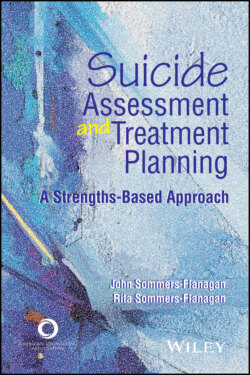Читать книгу Suicide Assessment and Treatment Planning - John Sommers-Flanagan - Страница 59
Ethical Issues Pertaining to Suicide in Online and Other Distance Counseling Formats
ОглавлениеCoronavirus-related economic shutdowns, social distancing, and other contemporary factors have quickly increased the use of counseling online and in other distance formats. Going by the names telehealth, telemental health, and telebehavioral health, these counseling platforms follow the same ethics codes and state and federal regulations as face-to-face counseling. However, attention to specific details with regard to informed consent, confidentiality and privacy issues, and emergency procedures is particularly salient when working with clients who are suicidal (Stoll et al., 2020).
Most online, telephonic, or text-based ethical issues in counseling are best addressed by counselor preparation and a clear and thorough informed consent process. Before engaging clients in distance counseling, address the following issues in writing and, when possible, via oral or text-based discussion:
Before meeting, do a preparation and competence check, including the following:Learn to use a counseling platform that is compliant with the Health Insurance Portability and Accountability Act of 1996 and has adequate data security and storage.Establish a clear and secure online payment system.Develop an electronic informed consent form that clients can review and sign before or at the beginning of counseling.
Collect information in advance about your client, including identifying information, best contact methods, a home address or location, a personal contact in case of emergency, and contact information of local emergency personnel (e.g., law enforcement, child protective services).
Describe your strong preference to openly discuss suicide and to work collaboratively, even when clients are in suicidal crisis.
Make sure your clients know what specific behaviors will prompt an emergency response (e.g., if clients call or text and leave a message that they are suicidal, or if clients hang up or go offline after making a suicide threat).
Make sure you and your clients agree to an emergency plan (e.g., “I will contact the police and give them your address or your last known location”).
Confidentiality is limited when you are using video, online, or telephonic counseling modalities. In particular, you may not be able to ascertain whether your client is in a setting that affords privacy; other people may be present and able to hear or see counseling interactions. In addition, when using text-based platforms, you face the possibility of identity theft—you may not know whether you are really interacting with your client. One method of addressing these limitations to confidentiality is to establish a prearranged challenge question (Rummell & Joyce, 2010).
Directly discussing confidentiality strategies with your clients is recommended. Keep in mind that online and telephonic counseling can be equivalent to face-to-face counseling, but typically the factors that make online approaches effective include (a) establishing and maintaining a therapeutic relationship and (b) implementing evidence-based counseling strategies (Castro et al., 2020; Hanley & Reynolds, 2009). The Zur Institute has a complete comparative list of ethics guidelines pertaining to telehealth counseling across 14 disciplines/organizations, including ACA, the American Psychological Association, the National Association of Social Workers, and the National Board for Certified Counselors (see https://www.zurinstitute.com/ethics-of-telehealth/).
